

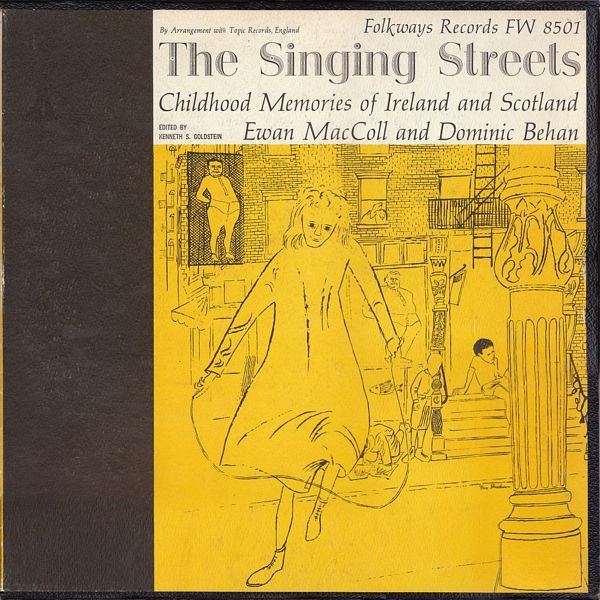 |
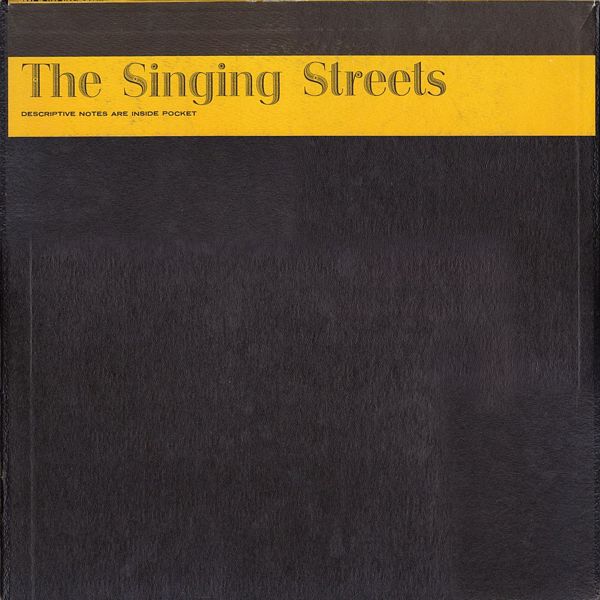
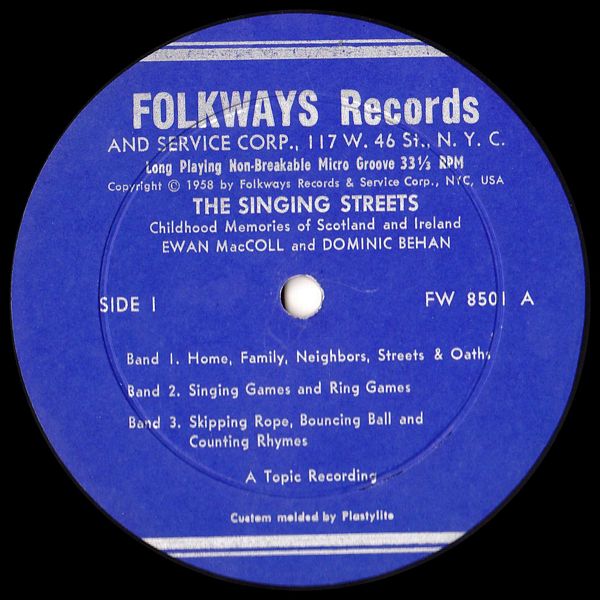
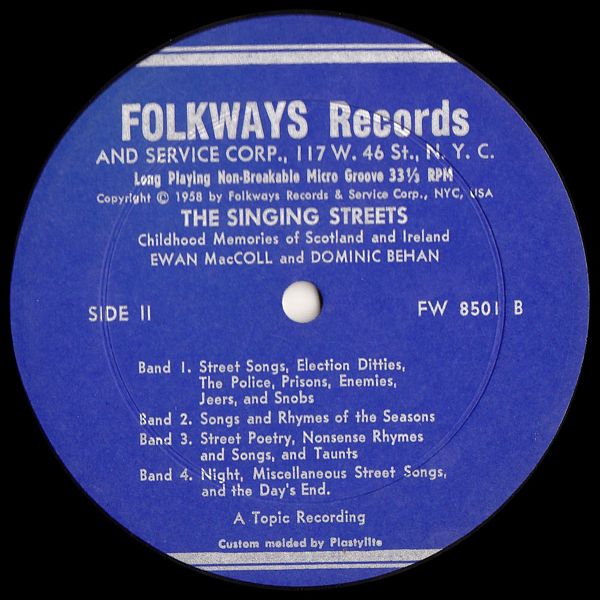
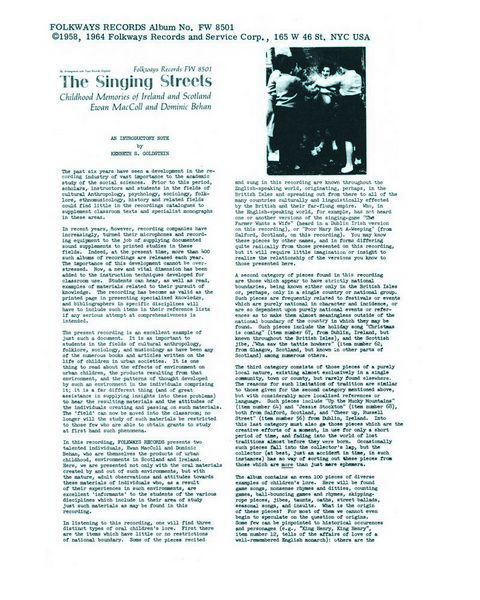 |
Sleeve Notes
An Introductory Note By Kenneth S. Goldstein
The past six years have seen a development in the recording industry of vast importance to the academic study of the social sciences. Prior to this period, scholars, instructors and students in the fields of cultural Anthropology, psychology, sociology, folklore, ethnomusicology, history and related fields could find little in the recording's catalogues to supplement classroom texts and specialist monographs in these areas.
In recent years, however, recording companies have increasingly, turned their microphones and recording equipment to the Job of supplying documented sound supplements to printed studies in these fields. Indeed, at the present time, more than 1*00 such albums of recordings are released each year.
The importance of this development cannot be overstressed. Now, a new and vital dimension has been added to the instruction techniques developed for classroom use. Students can hear, as well as read, examples of materials related to their pursuit of knowledge. The recording has become as valid as the printed page in presenting specialized knowledge, and bibliographers in specific disciplines will have to include such items in their reference lists if any serious attempt at comprehensiveness is intended.
The present recording is an excellent example of just such a document. It is as important to s tridents in the fields of cultural anthropology, folklore, sociology, and musicology as have been any of the numerous books and articles written on the life of children in urban societies. It is one thing to read about the effects of environment on urban children, the products resulting from that environment, and the patterns of thought developed by such an environment in the individuals comprising it; it is a far different thing (and of great assistance in supplying insights into these problems) to hear the resulting materials and the attitudes of the individuals creating and passing on such materials. The 'field' can now be moved into the classroom; no longer will the study of such materials be restricted to those few who ore able to obtain grants to study at first hand such phenomena.
In this recording, FOLKWAYS RECORDS present two talented individuals, Ewan MacColl and Dominic Behan, who are themselves the products of urban childhood, environments in Scotland and Ireland.
Here, we are presented not only with the oral materials created by and out of such environments, but with the mature, adult observations and attitudes towards these materials of individuals who, as a result of their experiences in such environments, are excellent 'informants' to the students of the various disciplines which include in their area of study just such materials as may be found in this recording.
In listening to this recording, one will find three distinct types of oral children's lore. First there are the items which have little or no restrictions of national boundary. Same of the pieces recited and sung in this recording are known throughout the English-speaking world, originating, perhaps, in the British Isles and spreading out from there to all of the many countries culturally and linguistically effected by the British and their far-flung empire. Who, in the English-speaking world, for example, has not heard one or another versions of the singing-game "The Farmer Wants a Wife" (heard in a Dublin Irish version on this recording), or "Poor Mary Sat A-Weeping" (from Salford, Scotland, on this recording). You may know these pieces by other names, and in forms differing quite radically from those presented on this recording, but it will require little imagination or insight to realize the relationship of the versions you know to those presented here.
A second category of pieces found in this recording are those which appear to have strictly national boundaries, being known either only in the British Isles or, perhaps, only in a single country or national group. Such pieces are frequently related to festivals or events which are purely national in character and incidence or are so dependent upon purely national events or references as to make them almost meaningless outside of the national boundary of the country in which they may be found. Such pieces Include the holiday song "Christmas is coming" (item number 67, from Dublin, Ireland, but known throughout the British Isles), and the Scottish jibe, "Wha saw the tattie howkers" (item number 62, from Glasgow, Scotland, but known in other parts of Scotland) among numerous others.
The third category consists of those pieces of a purely local nature, existing almost exclusively in a single community, town or county, but rarely found elsewhere. The reasons for such limitation of tradition are similar to those given for the second category mentioned above, but with considerably more localized references or language. Such pieces include "Up the Mucky Mountains" (item number 64) and "Jessie Stockton" (item number 68), both from Salford, Scotland, and "Cheer up, Russell Street" (item number 56) from Dublin, Ireland. Into this last category must also go those pieces which are the creative efforts of a moment, in use for only a short period of time, and fading into the world of lost traditions almost before they were born. Occasionally such pieces fall into the collector's lap, but the collector (at best, just an accident in time, in such instances) has no way of sorting out those pieces from those which are more than just mere ephemera.
The album contains an even 100 pieces of diverse examples of children's lore. Here will be found game songs, nonsense rhymes and ditties, counting games, ball-bouncing games and rhymes, skipping-rope pieces, Jibes, taunts, oaths, street ballads, seasonal songs, and insults. What is the origin of these pieces? For most of them we cannot even begin to speculate on the question of origins Some few can be pinpointed to historical occurrences and personages (e.g., "King Henry, King Henry", item number 12, tells of the affairs of love of a well-remembered English monarch): others are the breakdown of older traditional ballads and tales (e.g., "I know a woman, she lives in the woods", item number 23, obviously derives from the ballad of "The Cruel Mother" (Child #20). Some few are children's parodies of more recent creations, including music hall and popular songs (see items numbered 4, 56 and 59). Most of the pieces are created out of happenings and sights of everyday life. The possibility of their origin in any place or at almost any time, because of the universality of their subject matter, makes such a task an impossible one.
While the lore itself is of vast importance to the social scientists hearing this recording, to a great number of them at least equally important will be the contextual setting for these pieces presented by our two ' informants'. Here we are presented with a slice of pie turned out by the huge bakery which is urban Scotland and Ireland. Here we have not only the filling, but the topping, the crust, the pie tin, and most important, the bakers, as well.
First, we are introduced to the cultural milieu with which we are dealing. Poverty, a proud working-class inheritance, slum conditions, and the everyday, mundane things and occurrences affecting the individuals concerned. Next, we are presented with the oral products of that environment, set off against a train of thought concerning those products, not of the children living, playing and reciting those pieces of lore, but of two adult bearers of this urban tradition whose sensitivity to the setting is expressed in terms of mature afterthought. The opportunity presented by this recording to study the whys and wherefores of urban childhood traditions is almost an ideal one. At least, it is the next best thing to working in the field with the children themselves.
One fascinating problem suggested by working with children's lore, and, even more specifically, with the lore of working-class children, is the question of class boundaries of such lore, of this question, Dominic Behan has written:
"It can — so far as kids are concerned — be made only by children who own so little other rights to amusement that they must sing and make up songs about themselves and the places they inhabit: tenement house schools, neighbors, and, most and biggest of all, their playground — the streets. Maybe this is not quite true, maybe other classes of folks' children make up other classes of songs. All I can say is if they do, I have never heard them.
"So much for the songs; what of the games? Are they "class" bound? Do they belong to certain people or are they the property of all? Once again, I don't know. Once again, I will guess, and say all."
The challenge has been issued. It is the duty of folklorists, sociologists, and psychologists to take it up and answer the question. An attempt to do so from a library chair will prove futile; the data is insufficient and largely undocumented in most of the existing works on children's lore. By utilizing the existing tools of each discipline, we can expect to arrive at a satisfactory conclusion. We are fortunate in dealing with children's lore to be working in area which appears to have no beginning or end in time, and while some scholars have bemoaned the dying of oral tradition generally (such claims have been made for the past century, though I for one prefer to think of traditions changing and evolving rather than dying), none will be so rash as to deny the very vital nature of children's songs and games. There is no question of the existence of sufficient material for study.
FOLKWAYS RECORDS, in association with the Topic Record Company of England, is proud to present THE SINGING STREETS, childhood memories of Scotland and Ireland, created and performed by EWAN MacCOLL and DOMINIC BEHAN.
About the Artists
EWAN MacCOLL was born in Auchterarder, Perthshire, Scotland, the son of a Lowland Scots father and a Gaelic-speaking mother. Both parents had an extensive repertoire of Scots folk songs and ballads, and a large part of MacColl's tremendous repertory was learned from them.
Of his early childhood, excellent commentary is given in this recording. After leaving school at the age of 14, he spent the next 10 years working- at odd jobs between periods of unemployment. While working as a street singer, he was picked up by a B.B.C. director and given his first radio broadcast in a program called Music of the Streets. In 1935? MacColl began to devote an increasing amount of his time in writing programs for the B.B.C., including his first group of Folklore broadcasts. Included among his many folk music activities have been the collecting of folksongs for the B.B.C. archives, the production of regular folk music concerts, touring concert halls in England and Scotland presenting folk music at a popular level, and performing folksongs on radio broadcasts from every major city in Europe. He has also made numerous recordings of British folk songs available in most parts of the English-speaking world.
In addition to being one of Great Britain's leading folksingers, it should be noted that MacColl is a leading figure in British writing and acting circles. In 1947, George Bernard Shaw was sufficiently inspired by MacColl's work to remark: "Apart from myself, MacColl is the only man of genius writing for the theatre in England today."
MacColl is also the editor of three excellent pocket-size anthologies of folksongs: "Scotland Sings," "Personal Choice", and "The Shuttle and the Cage," the latter being the first general collection of British industrial songs ever published.
DOMINIC BEHAN was born in Dublin, Ireland, having a traditional Irish fiddler as a father and a folksinger as a mother. Born into a family of intensely partisan I.R.A. supporters, it was not surprising that he joined the Na Fianna h-Eireann (The Republican Boy Scouts) at the age of six and was an active fighter for the I.R.A. at 16. His activities on behalf of his political convictions have resulted in his being imprisoned, in Dublin and in London, four times between 1951 and 1954. Following in the footsteps of his uncle, the noted rebel songwriter Peadar Kearney, he has become" one of Ireland's leading political writers, his published works including poetry, rebel ballads, and political articles in leading Irish and British periodicals.
He has previously recorded an excellent album of I.R.A. songs for Riverside Records and has prepared several other albums of Irish folksongs which will be released shortly in this country.
THE SINGING STREETS Childhood Memories of Ireland and Scotland EWAN MacCOLL and DCMINIC BEHAN (The following is a complete script of this recording. Comments on the sources for each of the folklore items recited here are given at the end of the script).